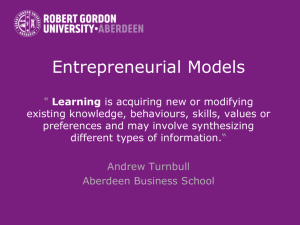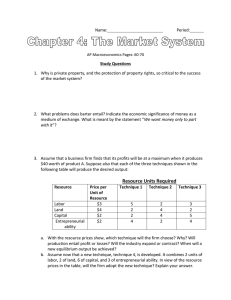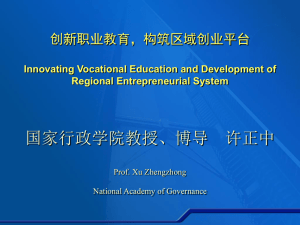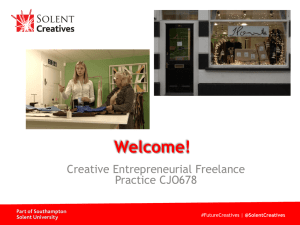CJO678
advertisement
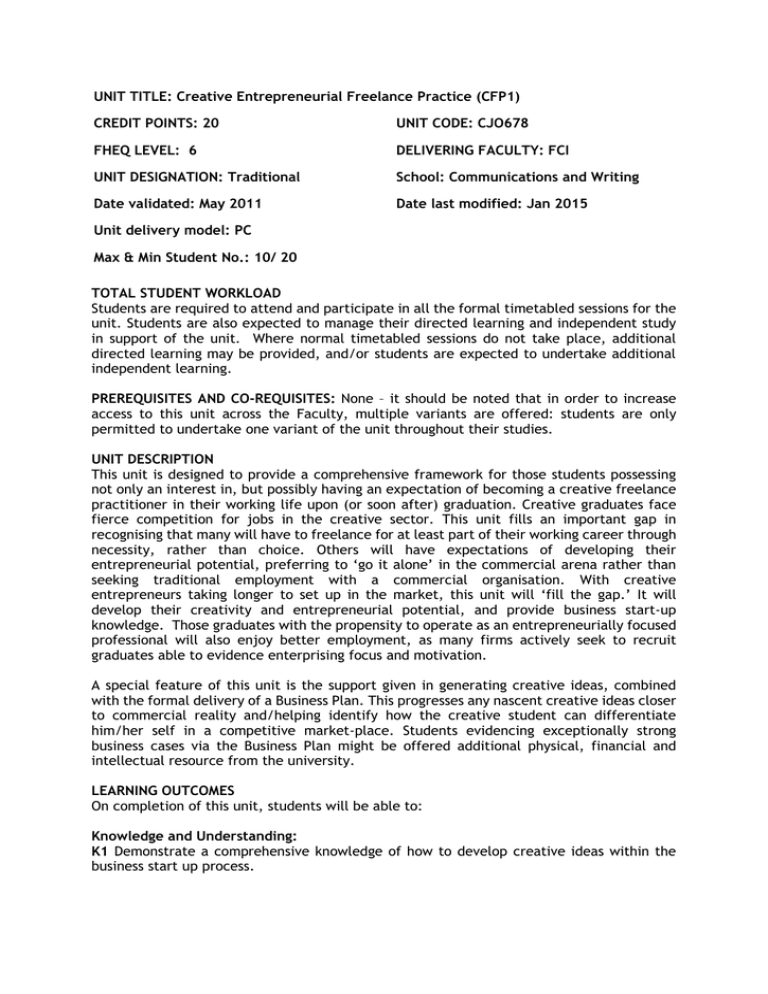
UNIT TITLE: Creative Entrepreneurial Freelance Practice (CFP1) CREDIT POINTS: 20 UNIT CODE: CJO678 FHEQ LEVEL: 6 DELIVERING FACULTY: FCI UNIT DESIGNATION: Traditional School: Communications and Writing Date validated: May 2011 Date last modified: Jan 2015 Unit delivery model: PC Max & Min Student No.: 10/ 20 TOTAL STUDENT WORKLOAD Students are required to attend and participate in all the formal timetabled sessions for the unit. Students are also expected to manage their directed learning and independent study in support of the unit. Where normal timetabled sessions do not take place, additional directed learning may be provided, and/or students are expected to undertake additional independent learning. PREREQUISITES AND CO-REQUISITES: None – it should be noted that in order to increase access to this unit across the Faculty, multiple variants are offered: students are only permitted to undertake one variant of the unit throughout their studies. UNIT DESCRIPTION This unit is designed to provide a comprehensive framework for those students possessing not only an interest in, but possibly having an expectation of becoming a creative freelance practitioner in their working life upon (or soon after) graduation. Creative graduates face fierce competition for jobs in the creative sector. This unit fills an important gap in recognising that many will have to freelance for at least part of their working career through necessity, rather than choice. Others will have expectations of developing their entrepreneurial potential, preferring to ‘go it alone’ in the commercial arena rather than seeking traditional employment with a commercial organisation. With creative entrepreneurs taking longer to set up in the market, this unit will ‘fill the gap.’ It will develop their creativity and entrepreneurial potential, and provide business start-up knowledge. Those graduates with the propensity to operate as an entrepreneurially focused professional will also enjoy better employment, as many firms actively seek to recruit graduates able to evidence enterprising focus and motivation. A special feature of this unit is the support given in generating creative ideas, combined with the formal delivery of a Business Plan. This progresses any nascent creative ideas closer to commercial reality and/helping identify how the creative student can differentiate him/her self in a competitive market-place. Students evidencing exceptionally strong business cases via the Business Plan might be offered additional physical, financial and intellectual resource from the university. LEARNING OUTCOMES On completion of this unit, students will be able to: Knowledge and Understanding: K1 Demonstrate a comprehensive knowledge of how to develop creative ideas within the business start up process. Cognitive Skills: C1 Analyse and critically evaluate new and/or abstract data and information without guidance and apply the information using appropriate techniques to their business plan C2 Confident in identifying and defining complex business problems and can apply appropriate knowledge and skills to their solution Practical and Professional Skills: P1 Develop an in-depth knowledge of the practical legal, financial and marketing skills needed to succeed in the creative commercial arena. P2 Understand how to create a professional Business Plan. Transferable and Key Skills: T1 Work independently to communicate and share information using appropriate media to a professional standard AREAS OF STUDY: The content of this unit will indicatively include Company formation and insurance Business Planning (financial aspects) Maintaining financial records Intellectual Property Presentation and pitching skills Selling and negotiation skills Contractual and legal aspects Employment Law Health and Safety and risk assessment Other modules may be incorporated if identified as being of practical interest and professional concern by the cohort. LEARNING AND TEACHING STRATEGY: Students will be guided as to what they need to know in approximately 20 hours of formal lectures (10 sessions x 2 hours) and then work both from their own knowledge and independent research to understand what skill-sets and information they specifically need to develop to be successful. The learning issues outlined above will be approached in an overtly practical way to provide essential knowledge and then students will be encouraged to reflect as to workable solutions that fit their own employability needs. Students will be given plenty of time to develop a Business Plan over the course of a semester but will receive directed support with respect to the formatting and content of their Business Plans in individual tutorial sessions (each student receiving 15 minutes tutorial per week or 2.5 hours per term). In sessions students are actively encouraged to present their own thoughts, ideas and solutions to enable peer learning. Sessions may be delivered in the Solent Creative incubation hub to encourage free-thinking and to inspire students to move on to consider procuring incubation space. Time to create a learning contract has been inserted to the overall provision of the course. At the outset of the course students will be asked to indicate the extent of their prior entrepreneurial experience via an enterprise audit and put into groups of teams to help develop the team cohesion skills emphasised so regularly by enterprise educators. Using an enterprise learning tool students will be asked to self-assess a range of enterprise skills both at the start and towards the end of the course. This self-reflective exercise is designed to improve confidence and entrepreneurial self-awareness. ASSESSMENT STRATEGY Students will be required to develop a professional business plan to support the development of business/freelance practice. This will include elements such as market research, competitor analysis, a marketing plan and financial forecasts and full costings. The student will then be required to present their business idea to a panel. This will assess their ability to ‘sell in’ their idea in writing and orally with the support of presentation aids. ASSESSMENT AE1 Weighting: Assessment type: Length/duration: On-line submission: Grade marking: Anonymous marking AE2 Weighting: Assessment type: Length/duration: On-line submission: Grade marking: Anonymous marking 50% Project (to incorporate Individual Business Plan) not less than 2,000 words No Yes No 50% Business Presentation (formal class presentation) 10 minutes No Yes No AGGREGATION & RE-ASSESSMENT RULES All elements of assessment will be arrogated to produce an over all unit mark Access to the usual University support programmes will be offered as and when learning support needs become identified. If the student fails AE1, an opportunity to re-submit the Business Plan will be offered to the student. If the student fails AE2, an opportunity to give another presentation will be offered. Unit Author: Updated by Caroline Barfoot, Feb 2015

